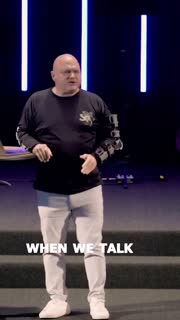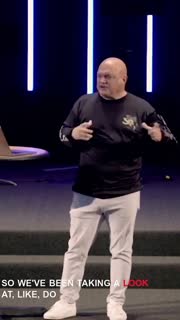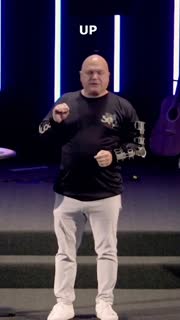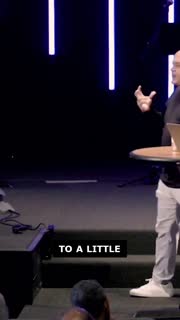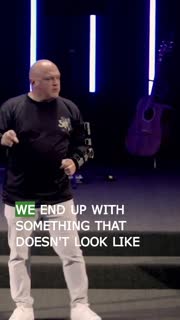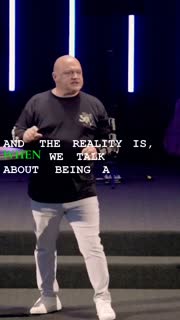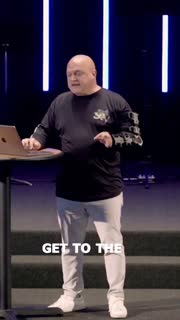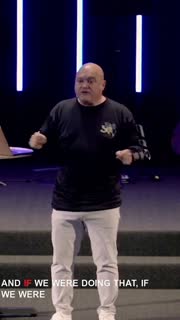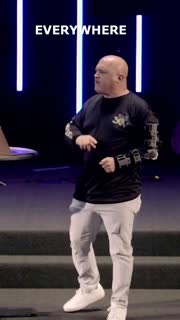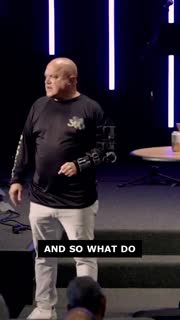Returning to Jesus: The True Path of Discipleship
Devotional
Sermon Summary
Bible Study Guide
Sermon Clips
1) "When we talk about even just shoring up and strengthening, this is bonus material now, thought that excite more of you. But, you know, when it comes to strengthening and shoring up, sometimes it's to bear the weight of what's coming. It's to bear the forces. And like, we've been seeing, like these little. We're seeing rumblings and shakings all over, right. We're seeing things get exposed. We're seeing it in church and politics, in Hollywood, in the music industry. I mean, it's literally, it's everywhere right now, right. And with that comes an incredible opportunity." [02:16] (42 seconds)
2) "So we've been taking a look at, like, do I look like a disciple? Am I following Jesus? Does the church look like followers of Jesus? And down to the minuscule things, you know, just, am I doing what he has said, what he's told us to do? Am I living that way? Do my thoughts line up? And I want us to kind of begin to move into this space of making disciples. How many of you know, like, you'll never lead somebody to a place that you haven't been, and you'll never make somebody into something that you aren't. So it starts with us taking a look with the Holy Spirit to go, am I following you?" [03:23] (42 seconds)
3) "What ends up happening as time goes on, the copy of the copy of the copy of the copy, you start to notice some things, right? It doesn't look the same as the original. And so I was looking at some of this, and they actually have terms for this but it's known as generation loss. So these successive generations result in distortion and degradation. To degrade is to lower to an inferior or less effective level. To degrade the image quality, to lower the quality of. To cause to deteriorate. Generation loss is the loss of quality between subsequent copies of transcodes of data." [06:22] (54 seconds)
4) "The switch back to a little bit, is that the church has been all about getting people saved to go to a destination, realizing that Jesus is the answer. He's the goal, he's the everything. And actually, he's not just the pathway to heaven. He is heaven. He is the kingdom. He's all those things we're not trying to lead people to somewhere. These are. These are entry, basic, elementary things. The mandate was to make disciples." [10:45] (39 seconds)
5) "We end up with something that doesn't look like the original. It's not as sharp and crisp. What we end up with is a stagnant pool of water instead of a river of life running through it. The goal was never to do all the stuff so that we could create a reservoir of what's happening here and protect it. And, you know. No. Do you know, like, one of the principles of the kingdom is if you want more of something, you give it away. You want more joy in your life, begin to operate from that and give it away. You want more. Right? So we are supposed to be making disciples." [16:12] (49 seconds)
6) "And the reality is, when we talk about being a disciple, it means that we orbit around him. He's not orbiting around us. We are. He becomes the center, and we are orbiting around him. And so I've been looking at the scriptures again, just kind of fresh. And, I mean, you know, like, you read something over and over and over again, it can be easy. Like, even as you're reading, as your eyes are scanning, the familiarity a little bit can cause you to kind of skip through it or read fast or kind of gloss over a little bit of. And I don't want to do that." [22:55] (33 seconds)
7) "And so when we get to the gospels, we have Matthew, Mark, Luke, and John. Matthew, Mark, and Luke are very similar. A lot of the same stories. John is the same time period, but he has kind of a different take. But when we look at it, we understand that all of these guys were writing these books with a different lens to tell the full story. Matthew is primarily writing to the Jews, and he's primarily trying to show Jesus as the king of kings, the Messiah. Mark is primarily writing to the believers in Rome, and he's trying to display Jesus as the servant of God. Luke is writing to Theophilus and the Gentiles and trying to show Jesus as the savior of the entire world. And John is writing to kind of the searching non believers and the new believers, and he's showing that Jesus as the son of God who reveals the father. And when you take the four of these, you get a beautiful, perfect picture." [28:00] (63 seconds)
8) "And if we were doing that, if we were creating the kind of community. I'm not saying we're not hear what I'm saying. Part of me is like the church at large, right. But we should be creating community and doing it in such a way that we see in acts two, where there's so much love and generosity and devotion to teaching and the word and scripture and communion, all this stuff, right? That fellowship is happening. All those things are happening so much and in such a way that people are taking note of that and going, how do I be a part of that? I don't have that in my life anywhere. And I see the result that's happening with you and with others." [44:10] (43 seconds)
9) "And so everywhere that Jesus went, though, he was bringing people into an invitation to an encounter with the father. One of my favorite stories is Zacchaeus, because he was a wee little mandeh. Hey, they have stores for us now. My whole life, I go to the store, they don't make my size, right. So I got pants that never fit right. And now, now we have stores. So Zacchaeus would have been a good company. But, you know, Zacchaeus is an interesting guy because he's been taking advantage of the whole community he's working for who they probably consider the enemy. And he's not just collecting the tax for the government, but, like, he's over collecting." [45:01] (53 seconds)
10) "And so what do we do? We put up the rough exterior that a lot of times, the people that we encounter, if we look at just the exterior and how they're behaving, their behavior and their actions, if that's the qualification for our love will never love anybody. So we have to walk by the spirit. The second thing is we have to have the eyes of the father, that we begin to see people as Jesus sees people the way that the father sees people. If every person is made in the image and the likeness of God doesn't mean that they're walking in his nature, acting like him. But if every person is made in the image and the likeness of God, that means that the original DNA is in there." [50:12] (52 seconds)
Ask a question about this sermon
2) "So we've been taking a look at, like, do I look like a disciple? Am I following Jesus? Does the church look like followers of Jesus? And down to the minuscule things, you know, just, am I doing what he has said, what he's told us to do? Am I living that way? Do my thoughts line up? And I want us to kind of begin to move into this space of making disciples. How many of you know, like, you'll never lead somebody to a place that you haven't been, and you'll never make somebody into something that you aren't. So it starts with us taking a look with the Holy Spirit to go, am I following you?" [03:23] (42 seconds)
3) "What ends up happening as time goes on, the copy of the copy of the copy of the copy, you start to notice some things, right? It doesn't look the same as the original. And so I was looking at some of this, and they actually have terms for this but it's known as generation loss. So these successive generations result in distortion and degradation. To degrade is to lower to an inferior or less effective level. To degrade the image quality, to lower the quality of. To cause to deteriorate. Generation loss is the loss of quality between subsequent copies of transcodes of data." [06:22] (54 seconds)
4) "The switch back to a little bit, is that the church has been all about getting people saved to go to a destination, realizing that Jesus is the answer. He's the goal, he's the everything. And actually, he's not just the pathway to heaven. He is heaven. He is the kingdom. He's all those things we're not trying to lead people to somewhere. These are. These are entry, basic, elementary things. The mandate was to make disciples." [10:45] (39 seconds)
5) "We end up with something that doesn't look like the original. It's not as sharp and crisp. What we end up with is a stagnant pool of water instead of a river of life running through it. The goal was never to do all the stuff so that we could create a reservoir of what's happening here and protect it. And, you know. No. Do you know, like, one of the principles of the kingdom is if you want more of something, you give it away. You want more joy in your life, begin to operate from that and give it away. You want more. Right? So we are supposed to be making disciples." [16:12] (49 seconds)
6) "And the reality is, when we talk about being a disciple, it means that we orbit around him. He's not orbiting around us. We are. He becomes the center, and we are orbiting around him. And so I've been looking at the scriptures again, just kind of fresh. And, I mean, you know, like, you read something over and over and over again, it can be easy. Like, even as you're reading, as your eyes are scanning, the familiarity a little bit can cause you to kind of skip through it or read fast or kind of gloss over a little bit of. And I don't want to do that." [22:55] (33 seconds)
7) "And so when we get to the gospels, we have Matthew, Mark, Luke, and John. Matthew, Mark, and Luke are very similar. A lot of the same stories. John is the same time period, but he has kind of a different take. But when we look at it, we understand that all of these guys were writing these books with a different lens to tell the full story. Matthew is primarily writing to the Jews, and he's primarily trying to show Jesus as the king of kings, the Messiah. Mark is primarily writing to the believers in Rome, and he's trying to display Jesus as the servant of God. Luke is writing to Theophilus and the Gentiles and trying to show Jesus as the savior of the entire world. And John is writing to kind of the searching non believers and the new believers, and he's showing that Jesus as the son of God who reveals the father. And when you take the four of these, you get a beautiful, perfect picture." [28:00] (63 seconds)
8) "And if we were doing that, if we were creating the kind of community. I'm not saying we're not hear what I'm saying. Part of me is like the church at large, right. But we should be creating community and doing it in such a way that we see in acts two, where there's so much love and generosity and devotion to teaching and the word and scripture and communion, all this stuff, right? That fellowship is happening. All those things are happening so much and in such a way that people are taking note of that and going, how do I be a part of that? I don't have that in my life anywhere. And I see the result that's happening with you and with others." [44:10] (43 seconds)
9) "And so everywhere that Jesus went, though, he was bringing people into an invitation to an encounter with the father. One of my favorite stories is Zacchaeus, because he was a wee little mandeh. Hey, they have stores for us now. My whole life, I go to the store, they don't make my size, right. So I got pants that never fit right. And now, now we have stores. So Zacchaeus would have been a good company. But, you know, Zacchaeus is an interesting guy because he's been taking advantage of the whole community he's working for who they probably consider the enemy. And he's not just collecting the tax for the government, but, like, he's over collecting." [45:01] (53 seconds)
10) "And so what do we do? We put up the rough exterior that a lot of times, the people that we encounter, if we look at just the exterior and how they're behaving, their behavior and their actions, if that's the qualification for our love will never love anybody. So we have to walk by the spirit. The second thing is we have to have the eyes of the father, that we begin to see people as Jesus sees people the way that the father sees people. If every person is made in the image and the likeness of God doesn't mean that they're walking in his nature, acting like him. But if every person is made in the image and the likeness of God, that means that the original DNA is in there." [50:12] (52 seconds)
